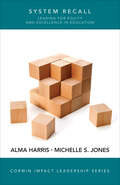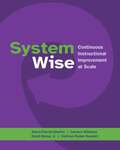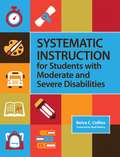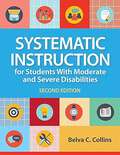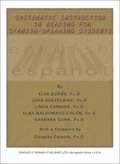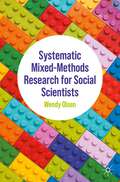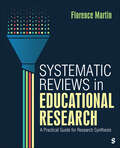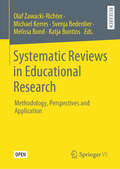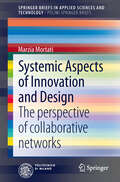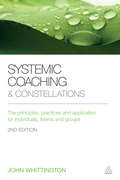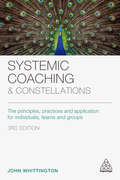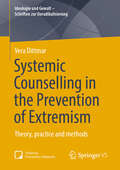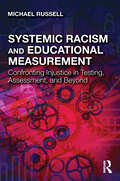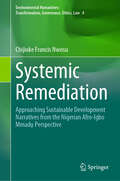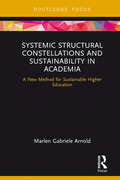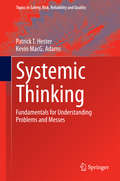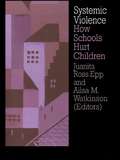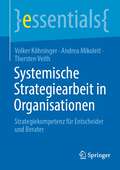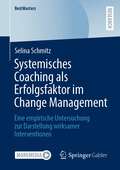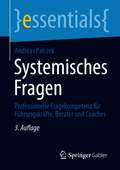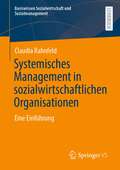- Table View
- List View
System Recall: Leading for Equity and Excellence in Education
by Alma Harris Michelle S. JonesThis book argues that much of what passes as contemporary educational reform in education is faulty and damaging. It argues that it is time for a ‘system recall’ and a need to look at what matters most in the pursuit of educational goals. The book focuses on what we know about contemporary educational improvement, transformation, and change. It will provide insights into what strategies work, long term, to build the capacity for principled change at the school and system level. The book will consider what leaders can do to secure principled school and system improvement which fully embraces diversity, equity, and equality. It will also dispel some myths about reform at scale and challenge some prevailing ideas about educational change that, it will be posited, are not helping many young people to reach their potential. The main argument of the book is that too many school and system improvement initiatives have not paid sufficient attention to equity issues in their pursuit of ever higher achievement and that the net effect of large-scale, international assessments have been to distract policy makers in ways that have not always benefitted young people. The book will use system examples to underpin and exemplify six core ways of re-botting the system and generating progress for all, It will highlight the implications for school and system leaders.
System Recall: Leading for Equity and Excellence in Education
by Alma Harris Michelle S. JonesThis book argues that much of what passes as contemporary educational reform in education is faulty and damaging. It argues that it is time for a ‘system recall’ and a need to look at what matters most in the pursuit of educational goals. The book focuses on what we know about contemporary educational improvement, transformation, and change. It will provide insights into what strategies work, long term, to build the capacity for principled change at the school and system level. The book will consider what leaders can do to secure principled school and system improvement which fully embraces diversity, equity, and equality. It will also dispel some myths about reform at scale and challenge some prevailing ideas about educational change that, it will be posited, are not helping many young people to reach their potential. The main argument of the book is that too many school and system improvement initiatives have not paid sufficient attention to equity issues in their pursuit of ever higher achievement and that the net effect of large-scale, international assessments have been to distract policy makers in ways that have not always benefitted young people. The book will use system examples to underpin and exemplify six core ways of re-botting the system and generating progress for all, It will highlight the implications for school and system leaders.
System Wise: Continuous Instructional Improvement at Scale
by Kathryn Parker Boudett Adam Parrott-Sheffer Carmen Williams David Rease Jr.Actionable and adaptable guidance for extending the proven Data Wise process from the classroom to entire school systems
Systematic Instruction For Students With Moderate And Severe Disabilities
by Belva C. CollinsTo ensure the best outcomes for students with moderate and severe disabilities, K 12 educators need to understand what constitutes good instructional practices and how to apply them in any classroom, with any curriculum. All the how-to guidance they need is in this accessible text on systematic instruction, a highly effective teaching approach rooted in applied behavior analysis. Developed by a seasoned educator who has trained thousands of teachers, this one-of-a-kind textbook fully prepares teachers to use systematic instruction procedures to link core content with critical life skills. Future educators will discover evidence-based methods that help them collect accurate screening and baseline data before instruction effectively use specific systematic instruction procedures make instruction more efficient by weaving non-targeted information into lessons improve students' communication skills through naturalistic language strategies expertly organize and deliver small-group systematic instruction enhance instruction with assistive technology plan successful instructional schedules for students across settings and teachers maximize instruction time by involving peers, paraprofessionals, and service delivery personnel help students maintain new skills and generalize them to other settings An ideal textbook for a wide range of teacher preparation courses, this student-friendly book includes sample lesson plans, chapter objectives, reflection questions, and a glossary. And the practical materials including 20 blank data collection sheets and quick step-by-step charts of instruction procedures make this an invaluable resource for in-practice educators. A comprehensive guide to the why and how of systematic instruction, this is the accessible text teachers need to succeed in inclusive classrooms and improve outcomes for students with moderate and severe disabilities.
Systematic Instruction for Students with Moderate and Severe Disabilities
by Belva C. CollinsTo improve outcomes for students with moderate and severe disabilities, K–12 educators need to understand the why and how of good instructional practices. They’ll find comprehensive guidance in the second edition of this bestselling text on systematic instruction, a highly effective teaching approach rooted in applied behavior analysis (ABA).
Systematic Instruction in Reading For Spanish Speaking Students
by Elva DuranThis text will help in the preparation of primary grade teachers throughout the United States, so that they may be successful with Hispanic students entering public school with little or no English background.
Systematic Instruction of Functional Skills for Students and Adults with Disabilities
by Keith Storey Craig MinerA text on vocational guidance of individuals with disabilities.
Systematic Mixed-Methods Research for Social Scientists
by Wendy OlsenThis textbook provides clear and accessible guidance on the importance and practical application of mixed-methods research. Professor Olsen presents a range of multiple mixed-methods techniques using quantified data. Critical realism underpins key arguments. She offers detailed examples based on wide experience with international applied social-science projects. The book shows readers how to join quantitative and qualitative data together. Detailed methods include: using multiple-level data; constructing new indices based on mixing survey responses and personal interviews; and using focus groups alongside a large survey. The book provides readers with linkages of data between different software packages. It explains the analysis stage in mixed-methods research, interprets complex causality, shows how to transform data, and helps with interpreting social structures, institutions, and discourses. Finally, the book covers some epistemological issues. These include the nature and value of data. The author discusses validity and techniques for ensuring relevant, innovative conclusions. The book also touches on action research as an overarching participatory method.This book is based on clear and explicit definitions, is accessible to students and researchers across disciplines, and shows the appeal of mixed-methods research to those trained in quantitative methods.
Systematic Reviews in Educational Research: A Practical Guide for Research Synthesis
by Florence Martin"A straightforward approach for scholars new or familiar with systematic reviews. I felt invigorated to grab a team and begin work on a review after reading this text." - Audrey Conway Roberts, Bowling Green State University Systematic reviews aim to retrieve and synthesize existing research. This book describes the process of conducting systematic reviews in educational research and can be used by any social or behavioral scientist who is interested in research synthesis through systematic reviews. The readers are guided through author Florence Martin′s DISCAR process (designing, including/excluding, screening, coding, analyzing/synthesizing and reporting). In addition, the book also describes technologies used, ethical considerations, guidelines and future outlook for systematic reviews of research.
Systematic Reviews in Educational Research: A Practical Guide for Research Synthesis
by Florence Martin"A straightforward approach for scholars new or familiar with systematic reviews. I felt invigorated to grab a team and begin work on a review after reading this text." - Audrey Conway Roberts, Bowling Green State University Systematic reviews aim to retrieve and synthesize existing research. This book describes the process of conducting systematic reviews in educational research and can be used by any social or behavioral scientist who is interested in research synthesis through systematic reviews. The readers are guided through author Florence Martin′s DISCAR process (designing, including/excluding, screening, coding, analyzing/synthesizing and reporting). In addition, the book also describes technologies used, ethical considerations, guidelines and future outlook for systematic reviews of research.
Systematic Reviews in Educational Research: Methodology, Perspectives and Application
by Olaf Zawacki-Richter Michael Kerres Svenja Bedenlier Melissa Bond Katja BuntinsIn this open access edited volume, international researchers of the field describe and discuss the systematic review method in its application to research in education. Alongside fundamental methodical considerations, reflections and practice examples are included and provide an introduction and overview on systematic reviews in education research.
Systemic Aspects of Innovation and Design
by Marzia MortatiThe book provides a snapshot of a hot topic - the systemic nature of innovation and its relevance to design - with a trifold perspective: the academic level - the literature on innovation studies and design is often neglected and a clear connection between the two topics taken for granted; the research level - collaborative models are currently considered great opportunities for transforming consumption, production and distribution of goods, but a clear scholarly discourse is still forming; the political level - the European Commission and the OECD are devoting much effort to understanding and measuring the impact of design in innovation processes and firms and a clear contribution would greatly support this path. Thus the book provides an informed, historical and nuanced perspective to the relationship between design and innovation to contribute to all three levels and to propose a point of view that goes beyond aesthetics and meanings.
Systemic Coaching and Constellations
by John WhittingtonSystemic Coaching and Constellations offers a refreshingly uncomplicated path into a potentially complex subject, demonstrating how this approach can provide access to systems and deliver enduring benefits for coaching clients. This new edition offers a comprehensive introduction to the principles that sustain systems, real world descriptions of what systemic coaching is and how it can be useful as well as a step-by-step guide to integrating the principles and practices into coaching. Highly practical, Systemic Coaching and Constellations includes a wide range of exercises for application with individuals and teams. It also includes a brand new chapter on Belonging, fully updated case studies from coaches who have taken part in John's trainings, a joint ICF/EMCC constellation workshop and examples from coaches around the world, including Australia, Mexico, France, Spain, US and the Netherlands. Whether used in an initial selection meeting or to underpin all your coaching conversations and interventions, Systemic Coaching and Constellations offers an accessible, practical starting point to transform your coaching practice.
Systemic Coaching and Constellations: The Principles, Practices and Application for Individuals, Teams and Groups
by John WhittingtonSystemic Coaching and Constellations offers a refreshingly uncomplicated path into a potentially complex subject, demonstrating how to understand and manage intricate relationship systems as part of a powerful coaching agenda. It provides a comprehensive introduction to the principles that sustain systems, how to map and explore them through constellations, as well as a step-by-step guide to integrating these principles and practices into coaching. Featuring a variety of case studies from around the world to illustrate different facilitation styles and approaches, it also contains practical exercises which can be used in a variety of contexts, including one-to-one coaching, group coaching, leadership development coaching and managing conflict in teams.This updated third edition of Systemic Coaching and Constellations contains a new chapter on systemic supervision, new material on team coaching, systemic questions and resourcing constellations as well as new and refreshed case studies and updates to wider research and thinking. Whether used in an initial selection meeting or to underpin all coaching conversations and interventions, it remains an indispensable resource for coaches of all levels of experience and in all remits looking to transform their practice, as well as for those studying coaching as part of a degree or coaching qualification.
Systemic Cognition and Education: Empowering Students for Excellence in Life
by Ibrahim A. HallounThis book offers pedagogic and governance foundations and guidelines for systemic education. It provides an overall systems-based picture of what formal education should be about, and of how things should be carried out in practice, in order to empower students – and teachers – for success in life. It transcends traditional disciplinary education, showing how systemic, praxis immersive, convergence education (SPICE) produces graduates who know how to think outside the box and excel in practical real-life situations. Drawing on philosophy, cognition, and the latest developments in neuroscience, the book calls for systemic pedagogical frameworks that allow for different curricula to be coherently and efficiently designed, and consistently and systematically deployed across different disciplines and various grade levels in the context of mind-and-brain based experiential learning ecologies.This volume is a major design and practice reference for school teachers, university professors, graduate students, along with interested educators, educationists, and stakeholders in various sectors of society.
Systemic Counselling in the Prevention of Extremism: Theory, practice and methods (Ideologie und Gewalt - Schriften zur Deradikalisierung)
by Vera DittmarHow can systemic counselling on deradicalisation, distancing from and exiting extremism be successful? This book addresses this question. As a fundamental work on systemic deradicalisation counselling, it presents theoretical concepts using the example of Islamist extremism. As a practical guide, it offers application-orientated knowledge by presenting systemic methods of intervention using case studies. Voices from practice for practice explain the potential of systemic counselling and interdisciplinary guest contributions deepen individual aspects. Special challenges in the field of counselling and solution strategies are presented.
Systemic Racism and Educational Measurement: Confronting Injustice in Testing, Assessment, and Beyond
by Michael RussellSystemic Racism and Educational Measurement provides a theoretical and historical reckoning with racism and oppression produced through educational measurement and research methodology. As scholars and professionals in the testing, measurement, and assessment of human learning and performance work to exorcise race sciences, white supremacy, and other injustices from the field’s research and practice, new insights are needed into their root causes. This book is the first to posit that the theory of the White Racial Frame was and continues to be applied to the foundations, process, dissemination, and use of educational measurement, leading to instruments, findings, and decisions that perpetuate the racialized social structure of our nation. Even among well-meaning stakeholders who aim to improve humanity and address inequities, the White Racial Frame shapes the field’s research questions, the methods utilized, the data valued, the interpretations made, and the language used throughout. Students and scholars of educational measurement, testing, and psychometrics will find invaluable clarifications of terminology, concepts, and theories integral to understanding systemic barriers in the field; explications of educational measurement’s core purposes and its influence by the White Racial Frame; and a series of alternate frames, theories, and epistemologies intended to guide educational measurement toward anti-racism and increased fairness.
Systemic Remediation: Approaching Sustainable Development Narratives from the Nigerian Afro-Igbo Mmadụ Perspective (Environmental Humanities: Transformation, Governance, Ethics, Law #4)
by Chijioke Francis NwosuSince the issues and discourses surrounding sustainable development entered its phase in our contemporary world, the political, social, economic, ecological, and cultural existence of our modern world has inevitably adopted varied measures to respond better to the demands of our time. This book contributes to the global call for transitions and transformations towards a more sustainable human society. This contribution is specific, dialogic and comparative and also has deep cultural and ethnological consciousness based on the Nigerian experiences and, by extension, the African experience. The research work presents as its background the hypothesis that varied forms of structures—socio-political, socio-economic, socio-ecological and socio-cultural—unite to constitute ‘structural sins’ (John Paul II) and, consequently, the banes to authentic and sustainable development. These dysfunctional structures were critically analysed and evaluated. Furthermore, the research work takes up the contemporary discourse on sustainable development, beginning with earlier development concepts, the impactful contribution of social documents of the church to development discourse, the timeline of the general global and sustainable development approach and governance, as well as the specifics of the twin documents of the year 2015, namely Agenda 2030 and Laudato Si. Again, an indigenised manuscript for development discourse known as Nigeria Vision 20:2020 was examined to delineate the fact that forms of indigenous efforts to discuss and administrate the development process are noticeable. However, such efforts have remained negatively exploited by both internal and external man-made corrupt factors. One such factors discussed in this book, among others, is the failure of Nigeria since independence to stabilise its power and energy sector.
Systemic Structural Constellations and Sustainability in Academia: A New Method for Sustainable Higher Education
by Marlen ArnoldIn order to create truly sustainable universities, we require new methods of visualising and interpreting them holistically as institutions built on complex relationships and systems, rather than as individual departments and people operating independently. This book uses a systemic structural constellations approach to demonstrate how we can build more sustainable higher education institutions, both in terms of teaching and research and at an operational level. Drawing examples from current research and teaching, Systemic Structural Constellations and Sustainability in Academia explores how universities are not only centres of teaching and learning but can also play a crucial role in enabling future decision-makers to appreciate and contribute to a more sustainable future. Providing a clear introduction to systemic structural constellations and guidance on how to practically apply the theory to numerous aspects of the higher education system, this book will be of great interest to students and researchers of education for sustainable development, organisational learning and sustainable management, as well as those tasked with transforming the higher education system for the future.
Systemic Thinking
by Kevin Macg. Adams Patrick T. HesterWhether you're an academic or a practitioner, a sociologist, a manager, or an engineer, one can benefit from learning to think systemically Problems (and messes) are everywhere and they're getting more complicated every day How we think about these problems determines whether or not we'll be successful in understanding and addressing them This book presents a novel way to think about problems (and messes) necessary to attack these always-present concerns The approach draws from disciplines as diverse as mathematics, biology and psychology to provide a holistic method for dealing with problems that can be applied to any discipline. This book develops the systemic thinking paradigm, and introduces practical guidelines for the deployment of a systemic thinking approach.
Systemic Violence: How Schools Hurt Children
by Juanita Ross Epp Alisa M. WatkinsonThis text examines the negative practices of schools which are resulting in school systems failing students. Such practices include intrusive authoritarian administrative structures and procedures; inappropriate discipline; unrealistic expectations; and placid exceptance of exclusionary practices. Indeed, educational systemic violence includes any practice or procedure that prevents students from learning, thus harming them. Taking a close look at ways in which current social problems may be a result of, or even supported by, compulsory schooling, the contributors to this volume consider whether or not schools contribute to the violence amongst modern young people.
Systemische Strategiearbeit in Organisationen: Strategiekompetenz für Entscheider und Berater (essentials)
by Volker Köhninger Andrea Mikoleit Thorsten VeithMegatrends und Disruptionen verändern die Organisationswelt radikal und erfordern neue Formen der Unternehmenssteuerung. Neben Strategiekompetenz werden die Verantwortungs- und Entscheidungskultur sowie die Lernfähigkeit von und in Organisationen essentielle Faktoren für zukünftigen Erfolg sein. Systemische Strategiearbeit liefert hierfür Anregungen und Konzepte – zur Gestaltung einer modernen Zukunftsarbeit.
Systemisches Coaching als Erfolgsfaktor im Change Management: Eine empirische Untersuchung zur Darstellung wirksamer Interventionen (BestMasters)
by Selina SchmitzUnternehmen stehen teilweise vor großen Umbrüchen und Veränderungen, die nachhaltiges Management erfordern. Gewünscht ist eine reibungslose Anpassung an organisationale Veränderungen, während Mitarbeitende Wünsche und Sehnsüchte nach Ruhe, Stabilität und verlässlichen Strukturen hegen. Diese Ambivalenz, an welcher ein Großteil von Veränderungsvorhaben scheitert, wird intensiv beleuchtet. Dieses Buch bietet dahingehend eingangs eine Metaanalyse zu den Ursachen von Herausforderungen in organisationalen Veränderungsprozessen, welche zu Widerständen der vom Wandel betroffenen Mitarbeitenden führen. Es wird anschließend untersucht, inwieweit Interventionen aus dem Systemischen Coaching diese Herausforderungen für gelingende Veränderungsprozesse wirksam bearbeiten können und daraus ein begleitender Coaching-Prozess für klassisches Change-Management entworfen. Final werden praktische Implikationen für Manager, Berater und Coaches vorgestellt.
Systemisches Fragen: Professionelle Fragekompetenz für Führungskräfte, Berater und Coaches (essentials)
by Andreas PatrzekDas essential stellt praxisnah dar, wie durch Fragekompetenz erfolgreiches Führen, Beraten und Coachen gelingt. Es bringt die wesentlichen Definitionen und Techniken auf den Punkt, vermittelt die theoretischen Grundlagen und Strategien und zeigt die Umsetzung. Orientiert an zentralen Merkmalen des systemischen Ansatzes wird die Kunst der Fragekompetenz verständlich dargestellt. Mit zahlreichen konkreten Beispielen und Formulierungshilfen für die tägliche Praxis.
Systemisches Management in sozialwirtschaftlichen Organisationen: Eine Einführung (Basiswissen Sozialwirtschaft und Sozialmanagement)
by Claudia RahnfeldDas Lehrbuch liefert Basiswissen zur systemtheoretischen Organisationstheorie in direktem Bezug auf Managementaufgaben in sozialen Einrichtungen. Grundlegende organisationstheoretische Erkenntnisse werden praxisnah und schrittweise erläutert. Die Autorin zeigt, wie Führen, Lernen und Vernetzung in sozialen Einrichtungen und die damit verbundenen Kommunikationsprozesse systemtheoretischer Logik folgen können.
